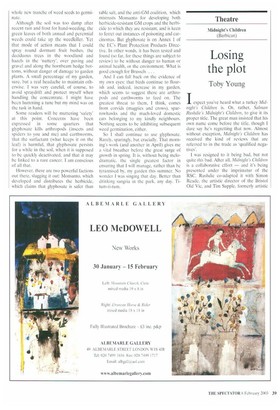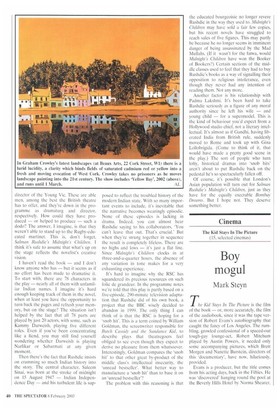Midnight's Children (Barbican)
Losing the plot
Toby Young
Iexpect you've heard what a turkey Midnight's Children is. Or, rather, Sabnan Rushdie's Midnight's Children, to give it its proper title. The great man insisted that his own name come before the title, though I dare say he's regretting that now. Almost without exception, Midnight's Children has received the kind of reviews that are referred to in the trade as 'qualified negatives'.
I was resigned to it being bad, hut not quite this bad. After all, Midnight's Children is a collaborative effort — and it's being presented under the imprimatur of the RSC. Rushdie co-adapted it with Simon Reale, the artistic director of the Bristol Old Vic, and Tim Supple, formerly artistic
director of the Young Vic. These are able men, among the best the British theatre has to offer, and they're down in the programme as dramaturg and director, respectively. How could they have pro duced or helped to produce — such a dodo? The answer, I imagine, is that they weren't able to stand up to the Rugby-educated martinet. This is, don't forget, Sa!man Rushdie's Midnight's Children. I think it's safe to assume that what's up on the stage reflects the novelist's creative vision.
I haven't read the book — and I don't know anyone who has — but it seems as if no effort has been made to dramatise it. To start with, there are 78 characters in the play — nearly all of them with unfamiliar Indian names. I imagine it's hard enough keeping track of them in the novel, when at least you have the opportunity to turn back the pages and refresh your memory, but on the stage? The situation isn't helped by the fact that all 78 parts are played by just 20 actors, with some, such as Kammy Darweish, playing five different roles. Even if you've been concentrating like a fiend, you may still find yourself wondering whether Darweish is playing Narlikar or Sabarmati at any given moment.
Then there's the fact that Rushdie insists on cramming so much Indian history into the story. The central character, Saleem Sinai, was born at the stroke of midnight on 15 August 1947 — Indian Independence Day — and his turbulent life is sup
posed to reflect the troubled history of the modern Indian state. With so many important events to include, it's inevitable that the narrative becomes wearingly episodic. None of these episodes is lacking in drama. Indeed, you can almost hear Rushdie saying to his collaborators, 'You can't leave that out. That's crucial.' But when they're strung together in sequence the result is completely lifeless. There are no highs and lows — it's just a flat line. Since Midnight's Children clocks in at three-and-a-quarter hours, the absence of any variation in tone makes for a very exhausting experience.
It's hard to imagine why the RSC has squandered its precious resources on such folie de grandeur. In the programme notes we're told that this play is partly based on a five-episode, 290-minute television adaptation that Rushdie did of his own book, a project that the BBC wisely decided to abandon in 1999. The only thing I can think of is that the RSC is hoping for a 'snob hit'. This is a term coined by William Goldman, the screenwriter responsible for Butch Cassidy and the Sundance Kid, to describe plays that theatregoers feel obliged to see even though they expect to derive no pleasure from them whatsoever. Interestingly, Goldman compares the 'snob hit' to that other great by-product of the middle class's intellectual insecurity, the 'unread bestseller'. What better way to manufacture a 'snob hit' than to base it on an 'unread bestseller'?
The problem with this reasoning is that the educated bourgeoisie no longer revere Rushdie in the way they used to. Midnight's Children may have sold a fair few copies, but his recent novels have struggled to reach sales of five figures. This may partly be because he no longer seems in imminent danger of being assassinated by the Mad Mullahs. (If it wasn't for the fan,va, would Midnight's Children have won the Booker of Bookers?) Certain sections of the middle classes used to feel that they had to buy Rushdie's books as a way of signalling their opposition to religious intolerance, even though they never had any intention of reading them. Not any more.
Another factor is his relationship with Padma Lakshmi. It's been hard to take Rushdie seriously as a figure of any moral authority since he left his wife — and young child — for a supermodel. This is the kind of behaviour you'd expect from a Hollywood studio chief, not a literary intellectual. It's almost as if Gandhi, having liberated India from British rule, suddenly moved to Rome and took up with Gina Lollobrigida. (Come to think of it, that would have made a pretty good scene in the play.) The sort of people who turn lofty, historical dramas into 'snob hits' aren't about to put Rushdie back on the pedestal he's so spectacularly fallen off.
Of course, it's possible that London's Asian population will turn out for Salman Rushdie's Midnight's Children, just as they have for the equally execrable Bombay Dreams. But I hope not. They deserve something better.



























































 Previous page
Previous page